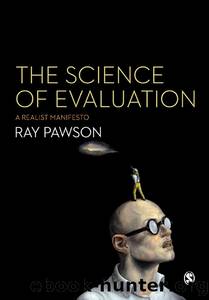The Science of Evaluation by Ray Pawson

Author:Ray Pawson [Pawson, Ray]
Language: eng
Format: epub
ISBN: 9781446252437
Barnesnoble:
Publisher: SAGE Publications
Published: 2013-03-06T00:00:00+00:00
6. The trustâdoubt ratio
* * *
We now arrive at the point of principle that acknowledges and seeks to accommodate the harsh truth that evaluative knowledge is always partial knowledge. I have repeated, becoming blue in the face, that in all policy analysis the problems addressed and the solutions posited are endlessly complex. VICTORE can never be vanquished. Placing theory at the pivot of evaluative inquiry changes this not one jot. Programmes harbour all manner of activities and influences along their length and breadth. We will always have an excess of contending theories to explain the unfolding of an intervention. An evaluator might make some headway in refereeing between rival accounts of one aspect of the intervention. Collectively, the discipline might then go on to adjudicate between another pair of hypotheses and then go on to rule in or rule out several further explanations for programme outcomes. But, just as surely as day follows night, there will always be further hypotheses, and plausible ones to boot, waiting in the wings.
The way to deal with this predicament is to live with it. Whether the field is natural science or engineering or policy analysis or common sense, we inhabit a world of partial knowledge. Against expectations, we discover that molecular particles travel faster than light (seemingly), that cruise liners topple over, that programmes meet with patchy success, and that true love never runs smooth. Nescience is itself multi-faceted. Smithsonâs (1989) âtaxonomy of ignoranceâ runs through the subtle differences between error, irrelevance, untypicality, taboo, undecidability, distortion, incompleteness, confusion, inaccuracy, uncertainty, absence, vagueness, probability, ambiguity, fuzziness and nonspecificity. This list provides a horribly familiar characterisation of much policy discourse. Uncertainty is the norm and in all cases we learn to live with ignorance by reducing it rather than eliminating it.
This is Campbellâs (1988: 318) solution to the complexity problem and his exposition of the idea carries several distinctly Campbellian labels, my favourite being the notion of âsquishy foundationalismâ, explained thus:
Download
This site does not store any files on its server. We only index and link to content provided by other sites. Please contact the content providers to delete copyright contents if any and email us, we'll remove relevant links or contents immediately.
Cecilia; Or, Memoirs of an Heiress — Volume 1 by Fanny Burney(32527)
Cecilia; Or, Memoirs of an Heiress — Volume 2 by Fanny Burney(31928)
Cecilia; Or, Memoirs of an Heiress — Volume 3 by Fanny Burney(31915)
The Great Music City by Andrea Baker(31898)
We're Going to Need More Wine by Gabrielle Union(19020)
All the Missing Girls by Megan Miranda(15888)
Pimp by Iceberg Slim(14464)
Bombshells: Glamour Girls of a Lifetime by Sullivan Steve(14037)
For the Love of Europe by Rick Steves(13810)
Talking to Strangers by Malcolm Gladwell(13330)
Norse Mythology by Gaiman Neil(13314)
Fifty Shades Freed by E L James(13215)
Mindhunter: Inside the FBI's Elite Serial Crime Unit by John E. Douglas & Mark Olshaker(9289)
Crazy Rich Asians by Kevin Kwan(9261)
The Lost Art of Listening by Michael P. Nichols(7475)
Enlightenment Now: The Case for Reason, Science, Humanism, and Progress by Steven Pinker(7287)
The Four Agreements by Don Miguel Ruiz(6728)
Bad Blood by John Carreyrou(6599)
Weapons of Math Destruction by Cathy O'Neil(6248)
